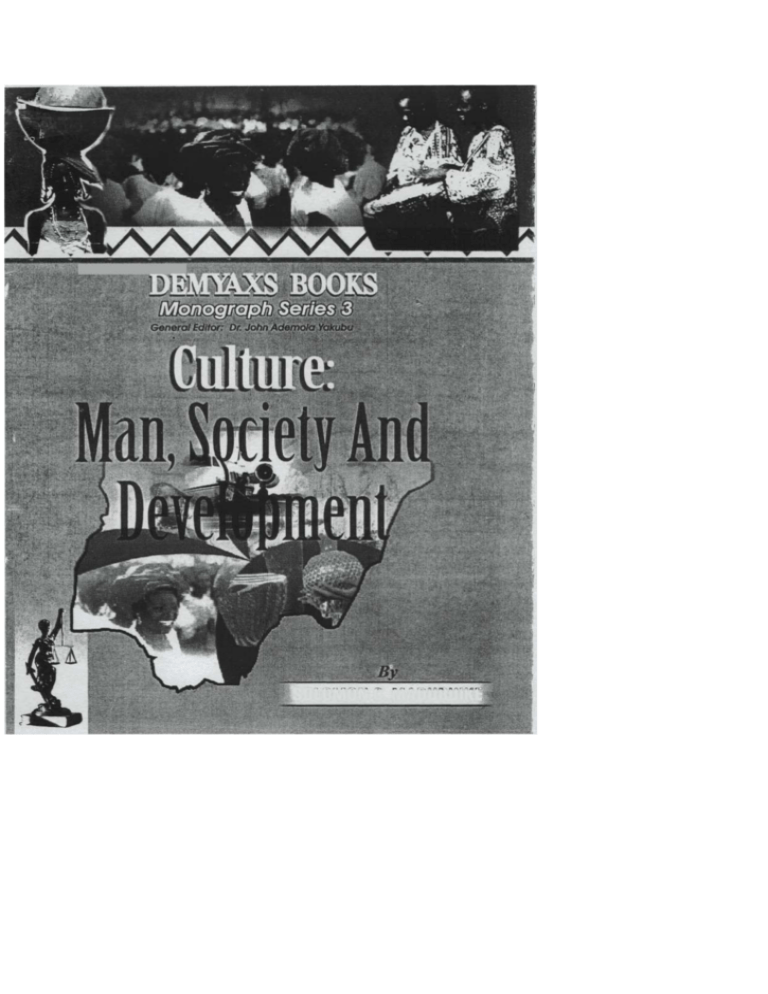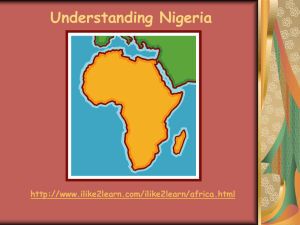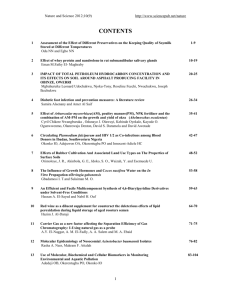
• :
:
i
,
.
SOLOMON C. MADUBUIKE
DEMYAXS LAW BOOKS
MONOGRAPH SERIES 3
General Editor: Dr. John Ademola Yokubu
CULTURE: MAN, SOCIETY AND DEVELOPMENT
By
SOLOMON C. MADUBUIKE
Institute of African Studies
University oflbadan
Ibadan
E-mail: solomadubuikerryahoo.com
A publication of
DEMYAXS LAW BOOKS
(A division of Oemyaxs Nig. Ltd.)
IBADAN
Copyright ©Solomon C. Madubuike
Published in Nigeria by
Demyaxs Law Books
(A Division of Demyaxs Ltd.)
Road 1 House 2 Agodi GRA
P.O. Box 22862, U. I. Post Office,
Ibadan,- Nigeria.
ISBN: 978 - 36225 -5-2
First Published in January 2003
All Rights Reserved
Printed in Nigeria.
INTRODUCTION
Culture or Civilisation, Man, Social environment and development are concepts central in
anthropology and other social science disciplines. It is a fact that man is a cultural animal in group
relationships cultivated through his social environmental experiences, conventions, laws,
morals, values, norms, rules, duties, obligations and rights, etc, which regulate and govern his
social relationships with members of the society.
Each of these concepts is the outcome of the multiple influences of biology, psychology, the
natural enviroranent and the historical processes of the creative mind of man to responses of these
"givens". These techniques, which come to play on daily basis, are generically called culture.
All these are what distinguish mankind from the rest of the animal tyQrld. Therefore, only men
of whatever kind and circumstances have the capacities for using and developing culture.
UNDERSTANDING CULTURE/CIVILISATION
In an attempt to define culture or civilisation we shall look at it from two aspects.
The first is common sense definition of culture or civilisation by the layman. Often we hear
people say that this person is cultured, civilised, or refined meaning he or she has good manners or
is respectful or has fear for sacred things. The problem with this definition is that it does not cover
all aspects of culture, or it is limited to behavioural patterns in social culture. The second
definition of culture is technical in the sense that it has scientific approach to what
anthropologists call culture. E. B. Tylor (1871) in his definition of the anthropological concept of
culture observed that culture or civilisation, taken in its wide ethnographic sense is that complex
whole which includes knowledge, belief, arts, norms, morals, laws, customs and any other
capabilities and habits acquired by man as a member of society. However, it is important to
note that culture and civilisation are synonymous in meaning. This is because the word civilisation
refers to advancement in material, social and mental cultures of the people at each epoch in
history. Each time a particular group of people add a new knowledge to the existing ones as
a way of improvement or recorded progress in social conditions, such is regarded as civilisation.
Therefore, a people's concept of culture or civilisation is determined by the values of that society
and their worldview.
In addition, culture is essentially a set of rules which enables man to live, interact, learn,
develop his physical capabilities and adjust to any environment. In the words of Peter. B.
Hammond (1975), culture "refers to that element in human behaviour which enables man to
make the most of his physical capabilities and adapt to different environments ^ without
highly spjecialized biological equipment". In other words, culture is a product of humanism
that which came out through reasoning based upon observation and experience of physical world.
Seen in broadest perspective, culture refers to social heritage of a group of people and their
children learnt-through socialisation. Thus, xone culture as contrasted with another in general
comprises the selective ways of thinking, feeling, acting, communicating and used by people of one
group and ethnicity - it distinguishes their way of life from that of other ethnic groups.
For instance, in Nigeria, we have multiethnic groupings that make up one natioh state. That is
to say that there is no single culture. Each ethnic group has its own culturnomics i.e. set of
rules, norms, art, belief, language, value, etc which are different from the other ethnic groups.
Take the Igbo culture and Yoruba culture or Hausa and Ibibio, etc, for example. Each
culture is different and distinct, and they belong to one nation state.
The question to be asked is whether there is what may be referred to as "Nigerian culture?"
The answer is simply
Culture: Man, Society and Development
Solcnncm/C.
that Nigeria has no single culture; rather it consists of multicultural groupings. Each
group of people has produced a different set of answers to the same question through
differences in material culture, social^culture and mental culture. Therefore, culture is
what it is-'because of man and certain environmental elements: terrestrial and
celestial, which are responsible for its growth, its addition and subtraction and its
functions. For in any society there is a culture, which shows the patterned ways of life'
of the particular people.
THE DEVELOPMENT OF CULTURE
Culture as a concept was developed in the late 19th and early 20th centuries
when anthropology started to develop as a discipline. However, cultural
anthropology is that main part of anthropology in which human culture is studied.
The development of cultural anthropology ha^ yielded two main results. First,
culture seen as a system organised in terms of interrelated patterns of activities of the
people. Secondly, the regular ways by which culture system develops in stages,
which can be reconstructed through the examination of archaeological evidence from
primitive, remains that of our ancestors.
For instance, the first archaeological evidence of humanlike primates dated many
millions of years shows earliest forms of human cultural patterns in group
relations. In addition, items such as painting, jewellery situates, and other material
products were discovered through excavation.
In all, culture develops as a result of basic needs of man, which in attempts to
meet he develops ideas, methods and arts to achieve satisfaction and continuity.
The question is what are these basic needs that are cultural in nature? The answer lies
in various cultures but there are cultural universals that are basic and are thus
common in any culture. These are Language: every culture needs
Culture: Man, Society and
Development
language to communicate for group relationship; understanding and
cooperation so as to develop and progress in that culture. Food - habit as provided
by the environment distinguishes a culture. Family/marriage patterns are
important in any culture, religion, music, funeral ceremonies and dancing,
represent the inner aspect (spiritual) of any culture. They express man's inward
being: when and how he feels about his creator-God in his moments of joy and
sadness.
Laws, customs, norms, and values show or tell what social organisation is
enforced in any culture, finally not the least; medicine and technology show or tell the
level of development in any culture.
Similarly, George Murdock (1954) includes among others, calendar, cooking,
courtship, games, dream interpretation, sexual restrictions, property rights and
myths as cultural universals which are basic to human needs.
CULTURNOMICS
The term culturnomics, according to Robert J. Samuelsori (2002) refers to
certain national traits, which are peculiar to local history, social structure,
psychology, religion and politics. In other words, it is a set of values, norms, rules,
arts, belief system, which legitimise local traditions of a particular group of
people within a geographical location. Thus, human nature may be constant or
changing but culture makes all the difference in human development.
COMPONENTS OF CULTURE
The phenomena of culture can be divided into three objectives: Material
culture, social culture, and mental culture. The tripartite objectives are what T.
Lapiere (1965) called the three universal ingredients of culture. He
identified them as ideology, technology and organisation. We shall use them
simultaneously, since they mean the same thing respectively.
MATERIAL
CULTURE
OR
COMPONENT OF CULTURE
TECHNOLOGICAL
The above consists of the products of man's creative abilities; his arts and skills used by
man to produce material goods and services for livelihood and security. Note that this aspect is
complementary to the survival of the society. Since no society can survive without meeting its
basic needs such as fpod, shelter and clothing.
However, it is peiftinerit to state that material culture in any society shows the level of
development in that culture. This is because the material elements of the culture express the
constitutiveness of mental and social components of the culture. If they are weak in creativity: arts
and skills, and lack organisation, their total development will be weak and underdeveloped, and
dependent on the developed cultures. Take Nigeria for instance, we are dependent on western
cultures for our technology and other economic strategies. In addition our mental and social
culture have changed from traditional to westernised ones. Thus, the indigenous cultures
have-been weakened from developing.
THE
SOCIAL
OF CULTURE
CULTURE
OR
ORGANISATIONAL COMPONENT
This segment of culture involves social action by which daily intercourse between individuals
in a society occurs. This is because no society can survive without interrelationships or group
cooperation. Social culture includes such activities as greeting patterns, systems of right and
duties, behavioural patterns, feelings etc. These start from the family level and move upward to
the larger society. As Alland (1967) observes, social behaviour in human groups is always
patterned in terms of specifier
Culture: Man, Society and Development
defined
relationships
between
individuals,
between individuals and groups, and
between groups.
For instance, in Igbo society, culture is premised in the Omenala Igbo, which regulates and
governs socio-economic, religious, political and other residual matters for social harmony and
cooperation. The Omenala Igbo represents every socio-cultural system in Igbo society. That is
to say that the three objectives of culture are called Omenala Igbo. This distinguishes Igbo
people from other species anci cultures. This could be found in their religion, education,
politics, marriage rituals, and economic relations.
THE MENTAL CULTURE OR IDEOLOGICAL COMPONENT OF CULTURE
This aspect includes the belief systems, values, ideas and knowledge, which a group of
people share. In fact mental culture is the powerhouse of the whole culture, in the sense that
it generates ideas< which determine the arts and skills used in producing material culture and
social organisation.
Although this could be said to be the cognitive model of individual's behaviour, it is certainly
concerned with the interrelationships between man and his environment (physical), and his
God (Spiritual). For instance, among the Igbo people their mental culture is based on three
sources; Chukwu God the creator of -heaven and earth, Chi-nmu personal God who guides him
and intercedes between him and Chukwu, and Nmo (Spiritual being), who oversees the social
environment: elemental forces, and can be used for both good and evil in the affairs of man.
In addition is the Ndichie (ancestors) who keep spiritual contact with their children and
relatives on earth through various spiritual contacts and for different purposes. They are called
upon in times of difficulty to intervene or intercede between the troubled Chi of an
individual and
Solomon/
C.
Nmo. .In the case of the family or community, they are invoked to fight the perceived
enemies.
Therefore the existence of mental culture enables man? to acquire knowledge through
experience and empirical inquiry. Consequently, he organises religion and residual social
institutions in the society.
PATTERNS OF CULTURE
So far we have considered the basic meaning of culture, the development of culture and
the components of culture. Now let us look at culture as patterns or process
mechanisms that differs in varying degree of human groups. A classification of these
patterns of culture will help us to understand the functions of culture in any society. i .
Cultural Complex: This means an inter-related set of cultural traits which show man as
a complex being living by reasoning on social, ideological and material needs.
Cultural Determinism: The result of belief, value, norins, knowledge etc. derived from
one's culture. It is also the reason for the level of development in any.society.
Cultural Diffusion: This refers to the transmission of cultural traits from one culture to
another. The western education today in Nigeria is as a result of cultural diffusion,
consequent upon colonialism.
Cultural Dynamics: This means cultural change or the reason for change and the
consequences of it. This also means that no aspect of a culture i.e. social, ideological and
material is static. Therefore, culture is dynamic, as a result of culture contact.
Culture: Man, Society and Development
Cultural Ecology: This means that culture is a product of hu: lanism based upon
environmental experiences.
Culture Integration: This refers to the bond or certain legacies that hold a set of
people together in a symbolic manner, i.e. language etc.
Cultural Lag: (a) This means inconsistencies within a cultural system resulting
from the unequal rates at which different cultural elements change, (b) A situation in
which social change lags behind the possibilities opened by technological change.
For instance, Nigerian experience since independence in 1960 to the present is a
typical example. The reason is that we depend on western culture rather than
indigenous culture. Hence we experienced unequal rates of developmental levels
and inconsistencies within our social, ideological and material culture.
Cultural Relativity: This refers to the practice of judging any culture by its own standard without
comparison. This is also referred to as ethnocentrism.
Cultural Revolution: This type of culture occurs as a result of marriage, war and slavery, etc. as
people submit tc anew way of life.
Cultural Trait: This refers to common characteristics found in any culture. It helps us to distinguish
a set of people in their cultural group.
Cultural Transmission: This refers to the process by which culture is passed from one generation to
the next. It is also called culture-education.
Cultural Universals: This means (a) Cultural features, such as the use of language, cooking, laws,
family etc, shared by
Culture: Man, Society and Development
Cultural Ecology: This means that culture is a product of hu: lanism based upon
environmental experiences.
Culture Integration: This refers to the bond or certain legacies that hold a set of
people together in a symbolic manner, i.e. language etc.
Cultural Lag: (a) This means inconsistencies within a cultural system resulting from the unequal
rates at which different cultural elements change, (b) A situation in which social change lags behind
the possibilities opened by technological change. For instance, Nigerian experience since
independence in 1960 to the present is a typical example. The reason is that we depend on
western culture rather than indigenous culture. Hence we experienced unequal rates of
developmental levels and inconsistencies within our social, ideological and material culture.
Cultural Relativity: This refers to the practice of judging any culture by its own standard without
comparison. This is also referred to as ethnocentrism.
Cultural Revolution: This type of culture Occurs as a result of marriage, war and slavery, etc. as
people submit tc anew way of life.
Cultural Trait: This refers to common characteristics found in any culture. It helps us to
distinguish a set of people in their cultural group.
Cultural Transmission: This refers to the process by which culture is passed from one generation to
the next. It is also called culture-education.
Cultural Universals: This means (a) Cultural features, such as the use of language, cooking, laws,
family etc, shared by
Solomon/C.
all human societies, (b) traits found in every culture is a cultural product or object found in all
societies. Although it is called universal yet there are dissimilarities in usage in each society.
Culture of Poverty: This refers to a distinctive culture thought to develop among poor people and
characterised by failure to delay gratification, fatalism, weak family and community ties.
Culture Shock: This refers to the personal disorientation that may accompany exposure to an
unfamiliar way of life and consequently disorganised established culturnormics.
TYPES OF SUBCULTURES
It is pertinent to state that these are subcultures within a culture. As has been shown in
earlier discussions that there are also many subcultures within eaqh culture, i.e. Igbo, Yoruba,
Hausa, Efik, Ibibio, Edo, etc. Here again, the cultural anthropologist comes to study the
similarities and differences in behaviour among the people. This is to enable him to depict the
character of the various subcultures and the processes of stability, change and development that
are characteristics of them. For instance, Mbaise subculture has a dialect, which
distinguishes it from other Igbo speaking people; the food habit of this group is also
different from other subculture in Igbo society. To that end, subculture exists as a result of
certain environmental factors that influence the behavioural pattern of a set of people within
the large group. It could be spiritual or social needs or both in most cases. For instance, in
modern time, terrorism has become a subculture as a result of spiritual need of a particular set
of people within a particular religion.
Culture: Man, Society and Development
TERRORIST SUBCULTURE
. This type of subculture occurs when individual's conviction on learned doctrines or
information drives him into moral slavery or prisoner-of-conscience. This is common among
groups, which may take such forms as religious, political, ethnic, humanistic, fundamentalists,
ethnocentricists, and extremists, etc. However, it is pertinent to state that terrorists are people
wl^o are increasingly assertive of their belief and value irrespective of others opinion and interest.
They also get involved in secret activities like the counter subculture.
OCCUPATIONAL SUBCULTURE
Frond time immemorial the need to satisfy one basic necessity of life has been the motivating
factor in bringing people of different family backgrounds together. In the prehistoric epoch, people
wandered from one place to another in search of livelihood/At a point they settled in a more
conducive environment and worked together and shared the same interest, experience and way
of life as offered by the environment. But in the contemporary world, occupational subcultures exi^t
within industrial societies where social class is in force: For instance during racial •problems in
America and South African Apartheid, workers of lower class of black race were living in the same
neighbourhood and j^poke specialised language of the occupational orientation. However, it is
pertinent to state that occupational subculture has developed over time into modern trade union
like Academic Staff Union of Universities (ASSU), Nigerian Union of Teachers (NUT), etc. They too
share common interest and experience as offered by the work environment.
COUNTER SUBCULTURE
This aspect of subculture is said to occur when a group within the total culture rejects societal
values and norms and seeks or introduces alternative patterns of behaviour.
Soiomon/C.
11
This kind of strange behaviour is always popular among the youths who want a change from the
existing culture.
As Ogunbamaru (1997) argues, secret cult i$ a counter subculture especially
among students irf tertiary institutions in Nigeria. He listed some cultural practices of
campus secret cults as nocturnal initiation ceremonies, which involve the taking of, oath
of blood of brotherhood or involvement in black magic etc.
THE FUNCTIONS OF CULTURE IN MAN AND SOCIETY AS DEVELOPMENT
In dealing with culture as a whole we must consider the place of man and factors of
social environment. xThere are two basic reasons for this. The first is that man is the prime
mover or creator of culture. The second is that the social environment in which man lives is
responsible for-all the ideas that influence man and may therefore be regarded as the
motivating force and the entry gate to the development processes of a society.
For instance, the South-Eastern Nigeria is called Igbo society and South-Western
Nigeria is called Yoruba society. What then determines their respective cultures? The
answer is that each culture is unique and distinct as a result of their respective environs,
which help to condition their symbolic processes. These symbolic processes are called
'symbolates'. "Things and Events that are dependent upon symbolizing". In other words,
man is a symbolate dependent upon environment to develop other symbolates such as
language, laws, family, arts, behavioural patterns, etc. that enable man to produce culture.
There are three functional requirements of culture in man and his social environment,
which serve to satisfy development processes: These functions are Adaptation, Adjustment
and Integration. They are reciprocal roles that help development in personality, political,
survival, social environment etc. in human societies.
12
Culture: Man, Society and
Development
Basically, individuals in the society adapt to their environment by three means:
technological, organisational and ideological. These are cultural mechanisms, which make
the development of man, social environment a&d the satisfaction of basic needs possible. It is
pertinent ta note that it is this development in culture that we call civilisation.
Civilisation occurs as a result of adaptive changes in the society. And it is through the three
means listed above. Therefore civilisation is the development that takes place in culture as a
result of the cultural mechanisms making possible the satisfaction of human needs. For
instance, it was as a result of problems posed by environment that man discovered the
techniques of making tools and their associated use for livelihood and security. Similarly
Carmeiro (1958) observes that to survive in the arctic environment the Eskimo must rely on
such sophisticated and specialised traits as the Igloo, the Kayak, the seal-oil lamp, dog-sled and
snow-goggles. A§ Woodbury (1954) argues that the purpose of adaptation is for efficient use of
time and space upon the earth in this way, human beings are able to adapt and adjust in any
given condition. But the question that remains to be answered is how cultural adaptation is
related to cultural adjustment?
The answer is that the two are synonymous. Adaptation is the adjustment of an individual
or group of people to its external and internal conditions of living.
Cultural integration on the other hand, functions as a primary source of cohesion. It is
through cultural integration that members of the society can survive, for Benedict (1934) it
refers to an identity of meaning within a diversity of cultural items; their conformity to a
common pattern, their embodiment of a common theme and similarity in customs, dance
forms, attitudes, feelings and other aspects of culture.
In all, these functions tend to reflect the development processes or the characteristic
achievements in culture or civilisation. As Sapir (1924) maintains that the only culture worthy
of the name is that which is inherently harmonious,
Solomon C.
balanced self-satisfactory, ...the expression of a richly varied and yet somehow
unified and consistent attitude towards life.
SYMBOLS AS SURVIVAL VALUES IN CULTURE
When we talk of symbols as concepts in anthropology and sociology as the case
may be, we mean those cultural traits, which distinguish man from other animals.
Symbol also refers to anything that carries a particular meaning recognised by
members of a society such as language, institutions, customs, arts, tools, norms
etc. According to George Herbert Mead, symbols lead to the development of human
intellect and the growth and transmission of culture. In this wise, symbols are
survival values in any culture, which distinguish man from other animals. For
instance, language as a symbol articulated in speech is used by a particular people
to give name and meaning to persons, things, objects and events in their society; it
serves as a survival value to these symbolates.
According to White (1945), all culture was produced and has been perpetuated
by symboling in general and by articulate speech in particular. What this statement
means is that culture is a product of symbolism without which there would not be
any human culture and society.
Accordingly, symbols were brought into being by man to function as value
judgement and serve his needs for, survival.
CULTURAL CONCEPT OF MAN
The need for a theoretical analysis of j(he concept "Man" is not a new
pre-occupation, but it/ is an unending worrisome and interesting academic
discourse. For instance, all scientific theories about man have three objectives in
common. First objective: they see man as a social animal. Second objective: they see
man as a cultural animal. Third objective: they see man as a development animal.
Taking this third objective as given, man is the only animal whose brain capacity can develop
social and cultural things, events and actions for continuity. This is another way of saying that
man's acquired characteristics are not social inheritance, rather they are genetic materials
acquired from parents: in a simple logical conditional proof, we can assume that the father plus
the mother make the child, peer group and environment make for character development. What
this means in a simple anthropological analytical form is that father and mother are equal to
child character formation, to peer group and environmental factors A + O = I i D ( I + Pg +
Env) = 1. Total character in development processes of man in society. On inspection we will find
that the child's total character in life is dependent on the above equation. .
14
Culture: Man, Society and
Development
What this simple anthropological equation of finance means is that man's social
psychology or cultural personality develops from mother and father genetic compositions
and move upwards to the larger social environment to seek additional genetic compositions:
which can be referred to as social genetics. These social genetics are the peer group and
environmental factors, which enable man to develop his possessed character in the society.
This character manifests in three deterministic paradigms, which exposes our individual
inner self or total make-up in the society. The first deterministic paradigms are the negative
behaviour, which often contrast with social norms and the civil laws in the society. Note that
when these negative characteristics manifest in a person we often use the genetic indexes:
parents' index and peer group index to trace the source of the character formation. For instance
Makinde (2002) observes that the parents are the rotten sources of negative behaviour that
manifest in their children's character. This manifest of the negative character is as a result of
lost cultural norms and values by those parents who are not in touch with their culture. This
means that the parents live on borrowed cultures. The second is the positive deterministic
character, which is always in agreement with social norms and the civil laws in the
society. The v third is the mixture of both negative and positive determinisms. This is
always the result of half baked behaviour or character dysfunction found in children.
Figure 1:
Schematic Diagram of Representation
A
Symbolises oY represents Male
0
Symbolises or represents Female
1
Symbolises or represents Child
Pg
Symbolises or represents Peer group Env.
represents Environment
Symbolises or
"Equal to"
+
D
i
"Plus"
Represents "Then"
CULTURAL CONCEPTION OF SOCIETY
Society as an organism consists of all forms of social life - whether persons, small
groups, role-constituted institutions like schools, or abstract institutions like languages
are constantly growing and changing. This Cooley called tentative process of continual
organisation and reorganisation, since the various elements are always developing new
relations in one another as they move forward.
For Cooley, the essence of social life is its mental character. Mind is all pervasive; it is
the medium in which thoughts develop and through which it is communicated. Human
action, so far as it is superior to the action of animals, flows from the mind. The history
of a language and the history of a human being are instances of mind in i process. He
believed that the child learns such sentiments as justice and kindness by
experiencing them in his relations with others, by’ the same kind of intercourse
through which thought is learnt. Society is a mental complex. It is tied together by
communication. The Asocial mind is moulded in the intimacy of the primary group - the
family; the children's play group, the neighbourhood of the larger organisation of the society.
From this experience the person receives his fundamental orientation to life, and the society
receives its model for integrated living in this way. Society is a product of culture, produced
on mutual agreement between individuals of different backgrounds but with common interest
for valued peace, cooperation and survival.
CULTURAL CONCEPT OF DEVELOPMENT
The word development is a dynamic concept. This, is because from the beginning of man's
existence in this world to the end of his existence, he preoccupies himself with developmental
values like maturity, social status, wealth, etc. As he continues to adopt and adjust at each
stage of his developmental processes in the society, his culture too continues to develop. At
best, let me put it this way: as development continues to change man at each stage in life, man
too continues to change or alter his behavioural patterns in the society. In this sense,
development is cultural in context. Every development in any human society is a product of
that culture.
It is pertinent to state here that it is out of place to assume that development is a very
vague concept as some scholars like Ibanga Ikpe has claimed, rather development is
culturnomics as I have shown earlier. It all depends on the attitude of the mind; the creative or
ideological culture, which I call the powerhouse of the society in which every development
processes, is generated from.
However, development is the attitude of the mind motivated by the need to meet and
satisfy human basic needs in accord with societal values. In this way, societal values determine
whatever development takes place in the society be it political, economic, family, education
and religious, and it is the accepted development that the
17
society would transmit from generation to generation by way of achievements. For instance,
in Igbo society, development means achievement in any sphere of life, which the individual
or community has aspired to in order to achieve success and once a successful achievement is
recorded the other members emulate or use it as paradigm to develop. Also, it is maturity of
mind by the individual to continue with life independent of his parents, to have a wife or wives
and children and fend for them, and socialise them into socio-cultural values of the society as
responsible people.
RELATIONSHIP BETWEEN
SOCIETY
CULTURE AND POLITICAL SYSTEMS IN THE
Because man is seen as both a cultural and political animal always seeking organisation of
economic production, power and authority in his society, we take an anthropological
survey of political systems in primitive and modern societies with particular reference to early
Nigerian political systems, pre-colonial to colonial and post-colonial epochs in history. There
are three reasons for this.
The first reason is to evaluate our pre-colonial political systems and development. The
second reason is to study the influence of colonial culture on our political systems during
colonial rule and the extent of damage done to our culture. The third reason is to link the past
with the present and see if there is any positive or negative development in our present political
system.
The variety of cultures and types of related political systems have led a number of scholars
to search for some causal relationship between cultures and political systems' development.
Obviously the searches which political anthropologists and political sociologists carry out are
those political ideas and values, which are associated with cultural content and
institutionalised in social relationships. Unlike other animals, man lives and interacts in a
world of symbolism.
Culture: Man, Society and Lte
WHAT ARE POLITICAL SYSTEMS?
As \with culture, political systems cannot properly function in the society without man.
That may be why Aristotle's classification of political systems is based on two criteria viz the
number of men who wield political power and the purpose of power in the society. Indeed a
political system is a patterned political relationship between men in authority and other
members in the society on the basis of agreed principles.
Similarly, Marx Weber's (1864-1920) typology of political systems was restricted to two
criteria viz the basis of legitimacy and types of political systems, which must be based on three
grounds: tradition, exceptional personal qualities (charismatic) and legality. In this way, all
social life, even culture, presupposes an intellectual activity in man of which the political
systems consequently reflect the concrete organisation of the society. This is because man's
mental culture and social culture are products of environmental conditions in which he
lives and develops into maturity.
EARLY NIGERIAN CULTURE AND POLITICAL SYSTEMS
Applying the above criteria to the political experiences of Nigeria before and after
colonisation we can then give a preliminary statement of what cultures existed in pre-colonial
Nigeria.
In general, there were ethnic groupings or cultures. The Igbo culture was patterned along
political system of gerontocracy based on charismatism, (exceptional personal quality of the
elder) also the Yoruba culture with its political system based on Obaship-centralised pattern
tradition and the Hausa culture with Emirship-centralised political system based on Islamic
tradition etc. The fact is that there are not less than 374 ethnic cultures in Nigeria with
different cultural values and types of political system. It is safe therefore, to say that there is no
Nigerian culture at that epoch in history, That is to say there was no political
Solomon
C.
19
system known as Nigerian political system until the colonisation and amalgamation
of all the cultural nations into one Nigeria in 1914.
However, it is pertinent to state that the different cultural nations witnessed a
new political system based on Western culture consequent upon colonialism.
Many demands were made ori the various cultural mechanisms such as norms,
customs, belief systems etc. through discriminatory authoritative allocation of
resources.
Apart from this, the colonial conversion process brought about a new
political culture, which was alien to the people, and subsequently the citizenry
political participation processes were altered by colonial masters thus, creating
apathy in their political behaviour. There are two reasons for this. The first reason is
that the people lost their traditional values to the new political culture due to apathy.
The second reason being that the pre-colonial political systems were in most cases
highly democratic. For instance, the Igbo political system of gerontocracy premised on
charismatism was a pure democracy before colonialism. This is because the people
had equal access to decision making. Similarly, the Yoruba political system of
Obaship was premised on tradition, which manifested as an advanced democracy
before colonialism. This is because the people had equal access to decision-making
through representatives of the ruling houses, but today such decision has to be
approved by the Governor of the state and not by tradition.
Issuing from the above, it is not out of place to conclude that the political
system in Nigeria today does not evolve from our cultural heritage; rather it is a
colonial inheritance, which does not find expression in our culture.
Iwara (1997) observes that a Nigerian culture that finds expression in an alien
language, oral or written, or both, is also an endangered speck in that any culture
without its own language is subject to problems of interpretation and meaning. What
is noteworthy here is that any system of a
culture that does not find expression in that culture is apt to vagrancy of development. As the
case may be in the Nigerian political system, the present Nigerian cultures manifest apocryphal
political development.
s*
RELATIONSHIP
BETWEEN
CULTURE,
HUMAN
AND
ENVIRONMENTAL DEVELOPMENT
There
is
cultural
dimension
to
human
and environmental
development. This is because culture is learnt by human beings within a given
environment as a means to an end. Alland (1969) observes that the existence of a social
tradition enables human beings to accumulate knowledge about the environment and to
pass it down to the
next
generation
so
that
adaptive
behaviours
can
accumulate through time. His idea is that culture enables people to develop themselves and
their environment in a highly organised manner that guarantees and promotes
cooperation, peace and orderliness for continuity and preservation of values
accumulated through observation and experiment of the environment.
Similarly Spencer and Tylor have had a lot to say about this/Both of them are of the view
that culture holds the key to the way in which man and society develop; and indeed that
culture is largely a human characteristic. For Spencer, 'Societies grow; while they increase in
size they increase in structure. As the structures differentiate, their functions do also. The
division of labour makes the social organism like the
individual
organism.
What is
noteworthy
about Spencer's
analysis
of social
systems is the unique
relationship he thought to exist between culture, man, environment and developmental
processes.
From this perceptive, culture, man and environment have analogous objectives,
but-culture cannot mean the same thing in all societies. In developed countries or -societies,
culture or civilisation tends to be directed towards advanced civilisation in any sphere of
human and environmental conditions necessary for adaptation,
21
Solomon C.
integration and adjustment in the society. Chikie saw human development in terms of great
technological revolutions, which shape the destiny of mankind. The first revolution comes with
the inception of culture. With the invention of tools began man's successful struggle with the
environment. (Alland, et al) But in underdeveloped or developing societies that are dependent
on the "fine products" of the advance cultures - developed societies^ ' culture does not exist
as a separate entity. Man and his environment is seen as the culture. That is to say that there_ "are
no marked differences between the culture, man and environment in development processes.
Everybody is as uncultured or uncivilised or primitive as the culture thus, lacking the last stage
of Morgan's tripartite scheme: i.e. savager^, barbarism and civilisation. It is civilisation that the
primitive cultures or societies is said to be lacking. That is, the societies lack capabilities to
develop from their lower status of savagery: infancy of human culture to the next Stage. This
is^ because the cultures of developing societies are said to lack innovation in any spheres of
knowledge, technology and organisation of hitman development: Even in the areas of family,
religion, economics and politics, where culture organising principles must operate with
exceptional growth through successive stages of development. The reason for this unhappy
state of affairs is the invasion of cultures and societies especially those of Africa, by Western
invaders who were equipped with advance cultural technologies such as gunboats, gun and
handcuff, etc. for human destruction, cultural imposition and environmental exploitation. As
Iwara asserted, this period in history witnessed the inevitable change in old values, beliefs,
symbols and norms for new cultures: of thinking and of doing things in accordance with new
foreign languages, new styles of dressing and new kinds of food, and so on and so forth.
Culture: Man, Society and Development
22
CULTURAL CONCEPT OF EDUCATION IN RELATION TO HUMAN
DEVELOPMENT
As it happsns in all societies, culture and education are taken to refer to the same
indigenous knowledge and experience. It is the accumulated experiences over a period
of generations within a given environment that form the knowledge in that society. And
it is this knowledge that we call the culture of the people. Iwara observed that there is no
real dichotomy between culture and education in Simple societies
where
industrialisation
and
the
need
for specialised training are non-existent or at a
very low level. •This means that culture and education are two in'one indivisible
dynamism
in
human
physical
and
mental development; irrespective of the
changes, growth and level of development man witnesses among equals. Therefore we
conclude that culture and education are analogous in both system and function in relation
to human development. But the questions are first, what is meant by culture-education,
second; why is western-culture education seen as formal i and indigenous-culture
education seen as informal? Before ' we analyse the questions, it should be noted that the
emphasis here or our concern is on education in relation to human development within a
cultural context. That is to say how the cultural knowledge helps man to develop into
maturity within the society and socialise his children by educating them with the norms,
values and belief systems of the society for continuity. Culture-education primarily
means to develop the mind of an individual with the acceptable ways of life
in a given environment such as the family, school, church, club, community and society. It
also refers to the fabric of the society through which a society develops its institutions
such as the family,
economic, religion,
political
and
education.
The
anthropological orientation of culture-education is that it is based on morality, and it
is this philosophy that regulates human development in all spheres of life. For instance, the
Chinese view of life is that the universe is a moral universe and all phenomena in the
universe are saturated with moral values. This means that culture-education is
related to
Culture: Man, Society and Development
universal morality, therefore every education must be based on culture and any education
that is not based on the culture of the people is deficient and is no education. Here we can see
how and why our inherited western culture-education system is deficient to our needs and
failing us to develop our social institutions. The obvious reason is that the moral values we
have acquired from Western culture-education
are
different from
our respective
cultural background. And this is the crisis problem we have in leadership in every colonised
society in the third world.
From what has been said so far, culture-education is unique and dynamic without
which there would not be any meaningful development in the society. It also provides the lead
way to technological breakthrough from simple experimental knowledge to complex
advancement.
It is the logic of human reasoning that distinguishes man from other animals in the
context of general knowledge and socio-linguistic analysis structured in symbolism; giving
meanings to every other person, thing, event and the universe.
In looking at culture-education so far, we have dealt' with the primary concern and
function of education of developing human mind along moral values through formal or
informal methods as adapted by the society for instance, in any traditional society be it the rural
England in the past times. These methods are generative ways of educating the people within
given settings like moonlight gathering of a kinship, market day gathering of a
group, ancestors' Remembrance Day, family meeting and community talk etc. Each is a way
of disseminating and acquiring knowledge and information of the societal values, morals,
norms, belief systems, and that is what education is all about. Afolabi (2002) notes that
these approaches not only help in filling the gaps created by the inadequacies of formal
classroom settings, but also add beauty and variety to academic life. This discussion has, as
far as possible, and necessarily in an intuitive manner dealt with what seems to be the
essential elements in culture-education and in relation to human development in any society.
CONCLUSION
From the foregoing analysis of culture, civilisation, man, social environment and
development certain deductions can be made concerning these concepts. The first is that
culture is the foundation of the society without which there will not be any human society. The
second is that it is directional, purposive and accumulative, by which man functions as a
human being for continuity and survives over all odds in his environment. The third is that
man as a cultural animal exploits his environment for continuity. In this way it can be argued
that culture is the simple logic of every day living that helps man to survive and develop. But
the problems facing human development in some societies like Nigeria arise from lack of
indigenous knowledge in their educational system. This problem is apocryphal because no
society rises above its indigenous knowledge by being dependent on foreign culture-education
system.
Although we might be thinking that our present education systems in technology, law,
medicine, politics, economics, religion, etc. are the best we can have because we are enjoying
foreign cultural scientific products like High-Tech Telephone, Motor-car, T.V. -Radio, Bicycle,
Western-Model, politics, and governance, etc. but they are not. We should be able te develop
beyond what other cultures provide for us.
Solomon/ C.
REFERENCES
Alland, Alexander. (1967) Evolution and Human Behaviour Garden City, New York, The
National History Press.
Atere, A. A. and Olagbemi, A. A. (1998) Dictionary of Sociology and Social Studies Ibadan:
Bolaji and Associates.
Benedict, Ruth. (1934) Patterns of Boston: Houghton Mcfflin.
Carneiro, R. L (1958) Culture: David L. Sills, (ed.) International Encyclopaedia Vol. 3, pp.
551-554
Jammond, Peter, B. (1975) Culture and Social' Anthropological: Introductory Readings in
Ethnology New York: Macrullan Publishing Co.
Lapiere, Richard. T. (1965) Social Charge, New York: McGraw Tittle.
Madubuike S. C. (1999) "Culture and Family Living: Effects of Ageigin in Nigeria" in Egbe Ifie
(ed.) Coping with Culture, Ibadan: Oputoru Books.
___________ (1999) Culture and Women Participation in Politics: A Study of Mbaise Women
Unpublished M.Sc. Dissertation submitted to Department of Sociology University of Ibadan.
Malinowski, B.A. (1944) Scientific Theory of Culture, Chapel Hill, University of North Carolina
Press.
Makinde, J. Kayode (2002) The Punch, 24th of April, 2002.
Morgan, L.4. (1877) Ancient Society, New York, Holt.
Murdock, G.P. (1949) Society Structure, New York; Macmillan Co. (1959) Africa: its people
& their culture history, New York, Megan Hill,
Ogunbameru, O. A. (2000) "Culture; the Fabric of Helman Society'1 in Kunle Ogunbameru and
wale Rotimi (eds) Man' and His Social Environment. Ibadan: Cardinal Crest Ltd.
Redcliffe^Brawn, A.R. (1952) Structure and Function in Primitive Society. Glencoe;
Free Press.
Supir, Edward. (1924) Culture; The Concept of Culture as quoted by Milton Singer,
in David L Sills (eds) international encyclopaedia of the Social
Sciences, New York: Macmillan Co.
Samuelson
R.J.
(2000)
"Culturnomics"
Newsweek. December 2001February 2002. PP.76-78. –
Steward, J. (1955) Theory of Culture Change. Urban, University of Illinois
Press.
Tylor, E. B. (1871) Primitive Culture, London, John Mirray.
White,
L.
(1959) The Evolution
of Culture,
New York Mcgran, Hill.
Afolabi, G. K. (2002) "Forward" in Party politics in Nigeria under Obasanjo Administration.
Monograph series No. 1 Dept, of Political Science and Sociology Babcock University
of Ilishan.









